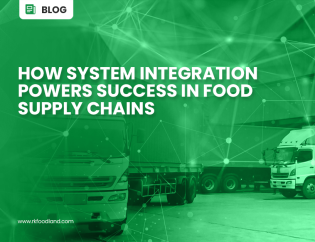
The increased popularity of plant-based foods has created new supply chain problems, particularly given that many of these organic products are being introduced by traditionally non-organic merchants. Organic supply chains and produce suppliers have long followed regulations regarding produce handling, such as temperature controls, cargo tracking, and supply and demand planning software, to ensure that the product could be tracked from farm to table and, in the event of a recall, traced back to its source. However, for meat replacements that incorporate numerous plant-based ingredients, supply chain organizations that handle these products face unique food safety problems. The food industry is now debating how to store and handle meat alternatives, how to manage each ingredient in the product, and, most crucially, how to determine temperature controls or the source of infection.
The popularity of plant-based food is further strengthened by a new analysis from The Good Food Institute stating that plant-based meat alternatives might account for 6% of worldwide meat consumption by 2030. Producing 25 million tons of product per year would be required in such a scenario.
With its growing stature in the food industry, brands from the plant-based food segments would want to string together a supply chain for their mock meat offerings. As supply chain specialists, catering to the food industry for three decades, we suggest considering the below-mentioned few points that might help with outlining a supply chain for plant-based meats.
Infrastructure
From a high level, the meat alternative supply chain is shorter and much more compact than the meat supply chain. Combine that with the fact that plant-based meat alternatives can get to the market a lot faster than traditional meat. The labor factor can make a big difference. Saying that producing PBM requires the process called high-moisture extrusion, which means the infrastructure to process it requires to handle the processing at different temperatures. This means the infrastructure not only needs to be technologically equipped but also requires a skilled workforce to see through the intricate processes. The plant-based meat brands require temperature-sensitive storage that is close to their potential markets due to its low shelf life making the process of production and delivery faster. It is advised for upcoming plant-based meat brands to impanel with a supply chain specialist for their temperature-sensitive storage needs since they are well-equipped to handle products with low shelf life and temperature-controlled needs. With a specialist handling the supply chain for the plant-based meat brands, their well-defined routes to market and strategic presence can be leveraged as well.
Workforce
According to a recent Deloitte research, when asked about the skills that supply chain employees including those in the plant-based meat segment should possess, 73% of respondents say technical competence is extremely or very critical, and even more, 79% believe leadership and professional competencies are extremely important. The technological capabilities required now are those that enable supply chain experts to address complicated risk management or statistical modeling issues that might arise in a complex and evolving plant-based meat sector. Talent development is another area that needs focus since the plant-based segment is at a nascent stage, the resources employed within the industry will require to be educated about the segment and the processes. The bottom line is that when it comes to a niche category like plant-based meat, the workforce needs to be both technologically equipped to understand the processes that are defined and specific to the industry while adhering to compliance and being able to take quick action in case a tough situation arises.
Central Information system
A centralized system can be affordable and adaptable, allowing plant-based meat brands to respond to market changes at a faster pace. Brands in this segment that use a centralized system might soon become leaner and more efficient. A consolidated information system ensures supply chain visibility giving decision-makers precise supply chain visibility. This would make it easier for plant-based meat manufacturers to identify which ingredients originated from which farms and would enable them to act promptly if an ingredient went bad prior to processing. Through the use of technology such as barcode tags and RFID cards, it would also be easier to separate poor batches of components from good batches, so avoiding a crisis situation at the start of the supply chain cycle.
Product and supplier management
Supplier relationship management (SRM) enables the plant-based meat business to take a systematic approach to evaluate suppliers’ contribution and influence on success, identifying strategies to improve their performance, and building a strategic approach to carry out what has been found. Supplier lifecycle management (SLM) should also be implemented in the supply chain to enable an end-to-end strategy to manage high-value or strategically significant suppliers, from selection to relationship closure. The critical element of the process is to recognize the value suppliers may provide and to integrate those benefits into procurement processes. By implementing such methods, plant-based meat brands can mitigate risk, boost efficiency, reduce price volatility, and consolidate their supply chains. The unified information system enables fake meat companies to locate suppliers that may assist them in reducing delays, resolving issues of unavailability, and enhancing transparency and traceability.
Temperature-controlled environment
The supply chain’s difficulty becomes even more formidable when resources and products demand temperature control, as is the situation with plant-based meats. Because the shelf life of such products is frequently limited, the speed and dependability of the transportation and handling systems become even more critical. As consumers turn toward plant-based foods, product oxidation becomes an issue that brands within this segment face. As a product, plant-based meat is a refrigerated item that is susceptible to light oxidation, thus reducing its shelf life and quality. Delivering the texture and flavor consumers demand can be extremely challenging if the product is not properly protected from oxidation during the storage and transportation phase. To ensure product integrity across the value chain, different temperature regimes must be addressed independently in terms of storage, staging, and distribution. Additionally, the items must be continuously inspected and maintained – using proper monitoring and tracking systems. Due to the significant risk of non-conformance at handover points, adequate operating processes and methodologies must be closely followed to minimize this risk.
By harnessing the innovation and expertise of a supply chain specialist, plant-based meat categories can outline a unique supply chain that ensures the integrity of their unique offering is met and the positive influence of the brand is resonated through to its potential markets.
Have a plant-based meat product? Let’s plan a unique supply chain together for it.









